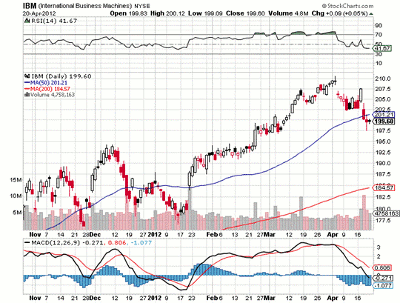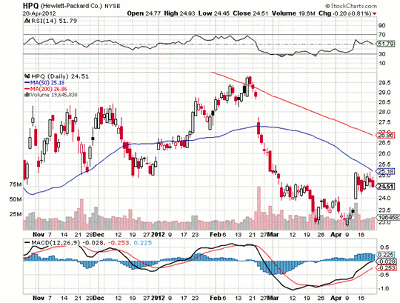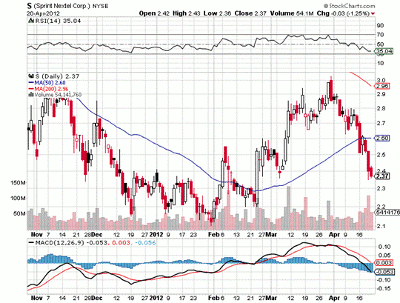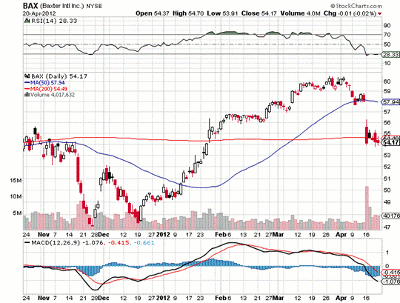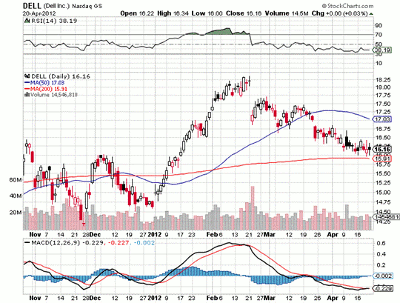Christopher Witrak of Minyanville.com highlights five company stocks that aren’t considered typical “green” investments, but have been officially ranked as among the most environmentally friendly on the planet.
Want to help the environment this Earth Day? Then consider investing in companies like IBM (IBM) and Hewlett-Packard (HPQ).
Surprised? What about stocks that focus on cleaner and renewable energy, such as First Solar (FSLR), you ask? Well, it appears at least in the short-term that the green energy industry will continue to struggle. The recent bankruptcies within the solar energy industry demonstrate to many that the renewable energy industry is still unable to thrive without the aid of the Department of Energy.
In the meantime, some of the largest publicly traded companies have implemented strategies and policies that have had a positive impact on the environment, like Intel (INTC). In October of last year, Newsweek released its 2011 list of the 500 most environmentally friendly companies in the US. These companies follow well what financial analysts call environmental, social, and governance metrics, or ESG metrics.
Sustainable business companies Sustainalytics and Trucost helped Newsweek in creating the list. Sustainalytics formulated systems for implementing ESG practices, and Trucost developed precise criteria for measuring a business's environmental impact. The important thing for investors to know is that following these systems and measurements not only makes businesses more environmentally friendly but also more profitable.
Studies prove it, too, showing that companies that followed ESG metrics outperformed the S&P 500 (SPY) by as much as 4.8%. Erika Herz, managing director for the Alliance for Research on Corporate Sustainability, says, “Sustainability reporting, or adding ESG metrics to investor analysis, is becoming more mainstream.” It appears that the environmental ideals no longer exist in the abstract for businesses. Analysts and businesses have discovered better, more concrete environmental practices.
In creating its list, Newsweek focused on the 500 largest publicly traded companies in the US based on revenue, market capitalization, and the number of employees. The companies were ranked by their overall “Green Score,” which comes from combining each company's Environmental Impact Score, Environmental Management Score, and Environmental Disclosure Score. The scores were weighted at 45%, 45%, and 10% respectively.
According to Newsweek, Trucost compiled the data for the Environmental Impact Score by using over 700 different measurements, such as emissions of nine key greenhouse gases, water use, and solid waste disposal. This Impact Score quantified the overall environmental impact of a company’s global operations. Trucost also included the equity investment under management of each company, factoring into its Impact Score the environmental impact that resulted from its percentage of equity ownership in the respective company.
Sustainalytics developed the method for calculating the Environmental Management Score. While Trucost’s method approximated the total cost of a company’s economic footprint, Sustainalytics looked at how effectively companies implemented policies and a firm's target goal. The company’s operations, its contractors and suppliers, and its products and services constitute the three parts of the Management Score.
To find this measurement, roughly 12 indicators are utilized across all sectors to see how well companies deal with certain environmental issues, supplemented with 40 sector-specific indicators, such as water use and hazardous-waste reduction. It then compared the positive performance of the company against its “environmental controversies and incidents” to calculate its score. For its data, Sustainalytics collects all possible company documents, media sources, online databases, government sources, NGO research, and other industry sources, and it contacts the largest shareholders in the various companies.
Trucost and Sustainalytics both calculated the last 10% of the Green Score, or the Environmental Disclosure Score. To calculate the Disclosure Score, Trucost determined how well each company informed the public of its “material impact” on the environment. Sustainalytics tracked whether the company had participated in initiatives such as the Global Reporting Initiative and Carbon Disclosure Project.
NEXT: See the Top 5 "Green" Company Stocks
|pagebreak|Here are the top five companies on Newsweek’s Green Rankings.
IBM (IBM)
"IBM is a poster child for a company evolving with the times—first from hardware to software, and now through sustainability solutions across energy and water efficiency, smarter cities, etc. as categories of opportunity to drive future revenue. IBM not only looks for such environmentally focused revenue opportunities, they are also now demanding environmental reductions from their suppliers.”
- Newsweek Green Score: 82.5%
- Environmental Impact: 78.8%
- Environmental Management: 86.2%
- Transparency and Disclosure: 83.0%
Hewlett-Packard (HPQ)
“Hewlett-Packard has a strict environment, health, and safety management system, and it requires newly acquired companies implement the same rules during their integration process. In 2009, HP launched the Global Workplace Initiative to make the company’s facilities more sustainable and reduce the company’s environmental impact. Most of its building projects are overseen by the HP Global Design Center; sustainable-design features include renewable building materials, and efficient lighting and water systems.”
- Newsweek Green Score: 75.8%
- Environmental Impact: 66.7%
- Environmental Management: 87.6%
- Transparency and Disclosure: 63.7%
Sprint Nextel (S)
“After an internal review in 2007, Sprint realized that it was a long way from being as environmentally responsible as it could be; it was especially lacking in eco-friendly products. In 2009, the company launched its first environmentally responsible device, the Samsung Reclaim cell phone. By 2011, Sprint had launched four such products, and it was the first US carrier to sell more than one eco-friendly device.”
- Newsweek Green Score: 75.6%
- Environmental Impact: 71.5%
- Environmental Management: 81.5%
- Transparency and Disclosure: 68.0%
Baxter (BAX)
“In 2010, the company made vast strides in terms of meeting its environmental goals. It reduced greenhouse-gas emissions by 7%, or 29% when indexed to revenue. Additionally, its energy use increased by just 4% from 2005, despite the fact that sales increased by 30% in the same time frame. Baxter also reduced its total waste indexed to revenue by 30%.”
- Newsweek Green Score: 74.9%
- Environmental Impact: 60.4%
- Environmental Management: 88.7%
- Transparency and Disclosure: 78.3%
Dell (DELL)
“In addition to the standard efforts to stay green, Dell has taken advantage of innovations in packaging—using mushroom and bamboo packaging to wrap the products the company ships. The mushroom packaging is biodegradable and can later be used as compost or mulch. In 2010, the company even launched an initiative to track the carbon footprints of individual products in order to reduce them in the future. In manufacturing, the company aims to have a 99% rate of recycling and reuse by 2012 and it looks like they are right on track—for the fiscal year of 2011, the company maintained a recycle and reuse rate of 95.7%.”
- Newsweek Green Score: 74.7%
- Environmental Impact: 66.4%
- Environmental Management: 88.6%
- Transparency and Disclosure: 49.3%
Some stocks from other sectors that made it onto Newsweek’s list include Office Depot (ODP) at No. 8, Ford (F) at No. 22, and Walt Disney (DIS) at No. 23. Newsweek also uses these metrics to compare the 500 largest companies in the world. You can see that list here.
By Christopher Witrak, contributor, Minyanville.com


